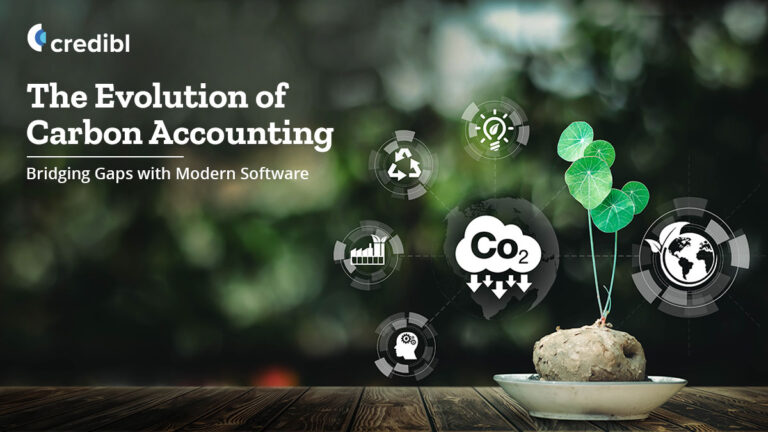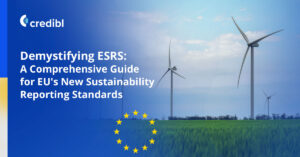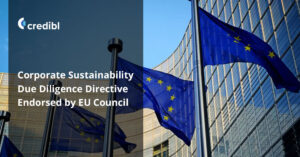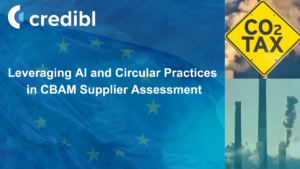Blog Summary
In this blog, we will explore the critical role of carbon accounting in the modern business landscape, where sustainability has become a key driver of corporate strategy. As companies worldwide face increasing pressure from regulations, investors, and consumers to reduce their carbon footprints, the need for accurate and efficient carbon accounting practices has never been more apparent. Modern software, powered by advancements in technology such as AI and machine learning, offers businesses the tools they need to meet these challenges head-on.
The blog will provide an overview of the latest trends in carbon accounting software, including the integration of cutting-edge technologies that enhance data accuracy and processing efficiency. It will also delve into the industry-specific applications of these software solutions, highlighting the benefits they bring to various sectors including manufacturing, energy, pharmaceutical, and hospitality. Furthermore, the blog will offer a global perspective, examining how different regions are adopting carbon accounting software and the factors influencing these trends.
Finally, the blog will look ahead to the future of carbon accounting, emphasizing the growing importance of transparency, software technology, and their pivotal role in the transition to a low-carbon economy. The concluding section will introduce Credibl ESG as a valuable resource for companies seeking to enhance their sustainability efforts through effective carbon accounting and ESG reporting.
Introduction
In the vanguard of corporate strategy, carbon accounting emerges as a pivotal element, integral to fulfilling the burgeoning global imperative for sustainability. This discourse examines the evolution of carbon accounting practices, accentuated by modern software’s transformative role. As regulatory pressures mount and stakeholder expectations ascend, the precision and efficiency of carbon accounting become paramount, facilitated significantly by technological advancements.
The Growing Importance of Carbon Accounting
The imperative for carbon accounting has escalated in parallel with the global sustainability agenda. Regulatory frameworks, coupled with the vigilant gaze of stakeholders—ranging from investors to consumers—demand an unprecedented level of transparency and accountability in carbon emissions reporting. The drive towards a low-carbon economy is not merely a regulatory mandate but a strategic business imperative, influencing investment decisions and consumer preferences alike. The stakes are high, as evidenced by initiatives like the Global Reporting Initiative (GRI), the Carbon Disclosure Project (CDP), and the Science Based Targets Initiative (SBTi), which underscore the criticality of robust carbon accounting systems.
Advancements in Carbon Accounting Software
In the quest for enhanced accuracy and efficiency in carbon accounting, software solutions stand at the forefront of innovation. The integration of artificial intelligence (AI) and machine learning (ML) not only streamlines data processing but also elevates the quality of insights derived from carbon accounting practices. Modern software platforms offer a suite of tools designed to automate and optimize the measurement, management, and reporting of carbon emissions.
Industry-Specific Applications and Benefits
The applicability of carbon accounting software transcends industries, from energy and BFSI to pharma and hospitality. Each sector faces unique challenges in carbon management, necessitating tailored solutions that software platforms are increasingly equipped to provide.
For example, the energy sector, grappling with the dual challenges of rising demand and the imperative for decarbonization, benefits immensely from software solutions that enable efficient energy management and carbon footprint reduction. The pharmaceutical sector, too, sees advantages in managing its complex supply chains and operational footprints through carbon accounting software, exemplifying the software’s versatility across diverse operational landscapes.
Global Perspectives and Regional Insights
Globally, the adoption of carbon accounting software is not consistent but is influenced by regional policies, economic priorities, and sustainability goals. For instance, China’s significant investments in carbon management solutions reflect its commitment to reducing emissions amidst rapid industrial growth. Conversely, the European Union’s stringent regulatory environment, exemplified by directives like the Corporate Sustainability Reporting Directive (CSRD), propels the adoption of carbon accounting solutions across its member states. These regional nuances underscore the global shift towards sustainability and the critical role of technology in facilitating this transition.
The chronology of carbon accounting is one of evolution and adaptation, where modern software solutions stand as pillars supporting the global transition to sustainability. As industries and regions navigate their unique paths toward carbon neutrality, the significance of robust, efficient, and transparent carbon accounting practices cannot be overstated. The journey ahead is complex, but with the advent of sophisticated software solutions, businesses are better equipped than ever to meet the challenges of our time.
Challenges and Opportunities in Carbon Accounting
The landscape of carbon accounting is rife with challenges and opportunities, shaped by the dynamic interplay of technological advancements, regulatory pressures, and evolving market expectations. As companies navigate this terrain, they encounter both hurdles and openings for innovation and strategic growth.
Challenges in Implementing Carbon Accounting Software
Adopting carbon accounting software presents several challenges for businesses. The primary hurdle is selecting the right platform amidst a burgeoning market with varied offerings. With an influx of $970 million invested into carbon accounting platforms in 2022, companies must shift through a plethora of options. This selection process is complicated by the nascent and untested nature of many platforms, amidst a backdrop where the consequences of inaccurate carbon tracking — including regulatory penalties and reputational damage — are increasingly significant.
Another challenge lies in the need for sector-specific solutions. The diversity of carbon footprints across industries — from construction to retail — necessitates platforms that can tailor their accounting to unique sectoral demands. Moreover, integrating these systems with existing enterprise applications, ensuring audit-grade accuracy, and maintaining transparency in carbon calculation methodologies are critical yet complex requirements that companies must navigate.
Opportunities for Innovation and Market Growth
Despite these challenges, the evolution of carbon accounting software heralds substantial opportunities for businesses. The surge in carbon management software, including IoT sensors, data analytics, and machine learning, provides companies with advanced tools for precise monitoring and reduction of their greenhouse gas (GHG) emissions. These technologies facilitate real-time energy consumption monitoring, pattern analysis for identifying emission reduction opportunities, and predictive analytics for proactive carbon management.
The trend towards net-zero commitments and the increasing focus on scope 3 emissions underscore the growing importance of comprehensive carbon management strategies. Companies making net-zero pledges, such as Google’s commitment to carbon neutrality by 2030, exemplify the strategic direction towards sustainability that aligns with consumer and investor expectations.
The Future of Carbon Accounting and Software Solutions
Looking ahead, the trajectory of carbon accounting is set to be defined by the increasing integration of technology, heightened regulatory scrutiny, and a deeper emphasis on transparency and sector-specific solutions. As the market for carbon accounting software continues to grow, companies will have the opportunity to leverage these advancements to not only comply with evolving regulations but also to position themselves as leaders in sustainability and environmental stewardship.
In conclusion, while the path to effective carbon management is fraught with challenges, it is also laden with opportunities for businesses willing to invest in the right technologies and strategies. The evolution of carbon accounting software stands as a testament to the collective effort towards a more sustainable and low-carbon future, offering businesses the tools they need to play a pivotal role in this global transition.
Credibl ESG: AI-powered carbon accounting with data-driven insights & reporting
Credibl ESG stands out in the realm of carbon accounting and sustainability reporting. It offers a comprehensive SaaS platform that captures and accounts for carbon emissions and provides a portfolio alignment tool and advisory services. This platform enables companies to precisely measure and manage their greenhouse gas emissions, which is crucial for effective ESG reporting.
By focusing on transparency and sustainability, Credibl ESG helps businesses create value and contribute positively to the environment. It addresses the increasing demand from investors and stakeholders for clear and compliant environmental and social impact reporting, marking a critical step towards mitigating climate change and promoting a sustainable future.
For a free demo of AI-powered Carbon Accounting Software, please register at the Credibl ESG.







